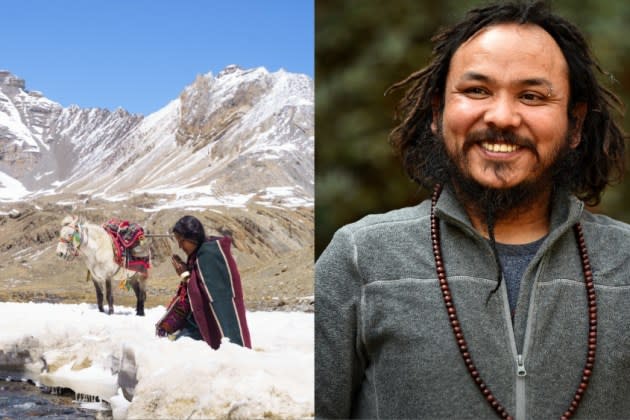Helicopter Rescues, Motorbike Accidents, Altitude Sickness: How Nepal’s Min Bahadur Bham Overcame the Odds to Shoot Berlin Competition Title ‘Shambhala’ (EXCLUSIVE)

Nepali filmmaker Min Bahadur Bham’s journey to make Berlin competition title “Shambhala” was arduous but an ultimately rewarding one.
Bham’s 2012 short “Bhansulli” debuted at Venice. His debut feature “Kalo Pothi” (aka “The Black Hen,” 2015) won the Fedeora best film award at Venice Critics’ Week and became Nepal’s official Oscar entry. It has been a nine-year process to bring “Shambhala” to fruition since then.
More from Variety
Christoph Waltz, Sebastian Stan, Tom Wlaschiha Celebrate Berlinale Films at Studio Babelsberg Party
'Black Tea' Review: Abderrahmane Sissako's Cross-Cultural Love Story is a Disappointingly Weak Brew
The filmmaker says that after “Kalo Pothi,” it took him a long time to write the script of “Shambhala,” which went through 45 drafts. He also wanted to experience the global labs, markets and residencies that he hadn’t on his first feature. These included Busan’s Asian Film Market, Cannes Cinefondation Residence and Locarno’s Open Doors. When those were done, finding the right cast and locations took a while and once those were finalized, COVID-19 struck.
“Shambhala” – a mystic, sacred realm in Tibetan Buddhism, also an area of significance in Hinduism, which means a place of peace – begins in a Himalayan polyandrous village in Nepal, where pregnant Pema faces scrutiny as her first husband Tashi vanishes on a trade trip to Lhasa. Accompanied by her de facto husband, the monk Karma, she embarks on a journey to find him, evolving her quest into self-discovery and liberation.
Bham had the idea for “Shambhala” before “Kalo Pothi” and the reasons for him wanting to make the film are deeply personal. “At a very young age I left my house and I had this dilemma about spirituality, about materialistic things, and also in terms of the relationship that I had with my family,” Bham told Variety. “It was my personal dilemma, questions, confusions about reincarnation, about this spiritual journey. That really haunted me to come up with the film.”
Bham says that the film’s sweeping landscapes, depicted in contemplative shots, invite the audience to inhabit Pema’s emotional landscape, experience her solitude and introspection firsthand and serve to mirror her inner world. “We are always running to materialistic things, but we forget to see that we have the best qualities inside us,” Bham said. “In order to be happy, it’s better to just look inside you and you will find your own happiness that will guide your life and make your life very easy. That was the core idea and message I really wanted to deliver.”
Like his protagonist, Bham’s process was also internal and external. “Being a male director, I was telling a story with a female protagonist. That was the biggest challenge for me as a filmmaker internally, because I had to somehow try to find the balance and ultimate sense of myself being a feminine side of my own character,” Bham said. Learning the Tibetan language, which the film is in, and the portrayed cultural and religious nuances, which are completely different from Bham’s own belief system, was another challenge.
The film was shot in the Upper Dolpo region of the Himalayas, between Nepal and Tibet, one of the highest human settlements on the planet. The cast and crew suffered from altitude sickness and the extreme cold conditions. The region has no electricity and the nearest fuel to power the generators was a four-day walk away. All the unit laptops, except one from France, refused to work at the location. In addition, an actor broke his leg, crew members had injuries and Bham himself had a motorbike accident. “It was an extremely hard situation,” Bham said. “During the shooting there were lots of helicopter rescues.”
Bham describes the adventure as a “life learning experience” for himself and his cast and crew. He says he transformed a lot and grew as a “proper human being” while several unit members turned vegetarian and gave up alcohol. “When I look back, it’s very interesting, though it was very much challenging at the time, but now it’s very good memories,” Bham said.
“Shambhala” is the first Nepali film to be in competition at a major festival and the first South Asian film in three decades in the main Berlinale competition. The film, produced by Bham, reunites him with his “Kalo Pothi” producer Catherine Dussart, who serves as co-producer alongside Verona Meier, Shuk Fong Chong, Zeynep Koray, Justine O. Bibhakar and Sunder Shakya, with Debaki Rai, Liao Ching-Sung, Roger Huang, Ruben Thorkildsen, Can Aygor and Salina Shakya as executive producers and Rajesh Prasad Khatri, Jeremy Chua and Lee Chi Lin as associate producers.
The film is a Shooney Films (Nepal) production in co-production with CDP (France), Ape&Bjørn (Norway), Aaru Production (Hong Kong), ZK Films (Turkey), Yi Tiao Long Hu Bao (Taiwan) Bangdel and Shakya Production (U.S.).
The cast includes Thinley Lhamo, Sonam Topden, Tenzin Dalha, Karma Wangyal Gurung, Karma Shakya, Loten Namling, Janga Bahadur Lama, Tsering Lhamo Gurung and Tsering Choeble Towa.
Best Friend Forever is handling international sales.
Best of Variety
Sign up for Variety’s Newsletter. For the latest news, follow us on Facebook, Twitter, and Instagram.
